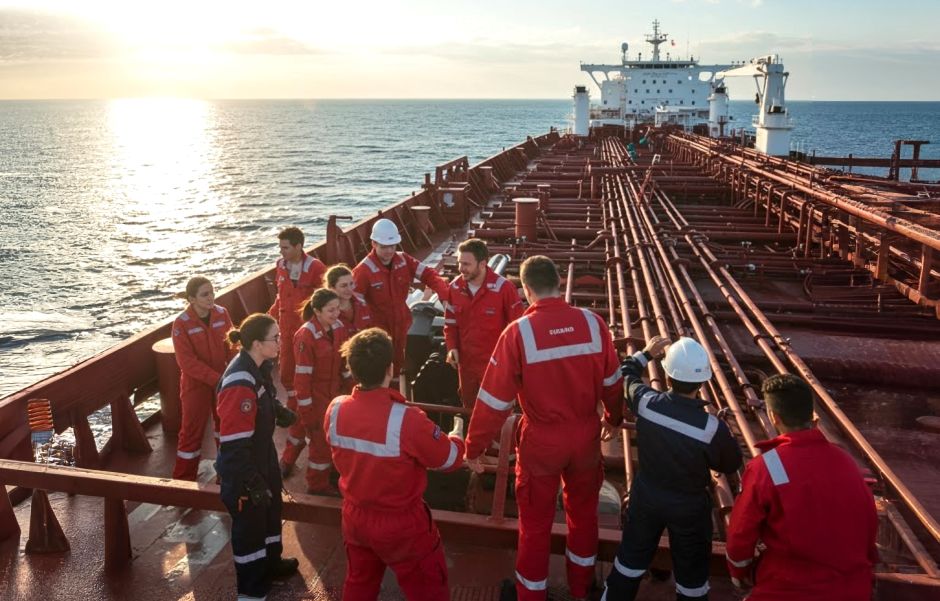From ready to change – how social sustainability will be improved

Leadership training, mentorship programs for women, policy labs, and even an academy – the second phase of the Redo research project, funded by the Swedish Transport Administration has turned ideas for improving social sustainability at sea into action.
“To meet future competence needs, the maritime industry must become an attractive career choice for more people than it is today. When we say that shipping is for everyone, it must also be perceived that way, and that requires active work to create an inclusive workplace culture,” say the researchers behind the Redo projects, describing the challenge they have been working intensely on for several years. In the first Redo project, Drivers and Barriers for Women at Sea (2021), several issues related to making the maritime industry more gender-equal were identified.
“The biggest barrier was the social work environment, a problem we realized affects everyone – not just women. For Redo2, we therefore decided to develop tools to strengthen the social work environment,” says Cajsa Jersler Fransson from the Swedish Maritime Administration, one of the key figures behind the Redo projects.
In Redo2, the work has been divided into five different work packages, she explains. Each package represents a key to a sustainable work environment. The first package focuses on leadership and its connection to psychological safety. As part of this, a new leadership training for ship officers was developed at Chalmers University of Technology.
“In the second package, we created a method for safe spaces for conversations. We worked a lot with how societal norms affect, especially gender norms – how it is to be a woman in a male-dominated world, how we view violence in a broader context. The method is based on shared responsibility to move from a culture of silence to a culture of conversation and to begin recognizing the connection between physical and emotional safety on board a vessel.”
Work package 3, called the Annual Wheel, includes twelve exercises for discussions about the work environment on board. The idea is for officers and crew to carry out the exercises together.
“Shipping is neither better nor worse than other industries, but we have a special challenge in that we don’t go home at night. This means that you don’t get any relief from family or friends. Additionally, it’s difficult for outsiders to understand the environment we work in. In other industries, you might hire consultants to talk about the work environment, but that doesn’t work in shipping. Therefore, we wanted to develop materials that can be used directly on board,” says Cajsa Jersler Fransson.
Work package 4, Supporting Structures for Women at Sea, is the only one focused on women as the target group. As part of this, several collaborations have taken place, including a mentorship program created in partnership with WISTA Sweden, where mentees and mentors meet for a year to strengthen the individual in their professional role.
“We have helped initiate various initiatives, including at Chalmers, where Redo2 was involved in creating a work environment day for students going on their first internship, and at NOS, where Redo2 organized workshops for the Equality in Shipping initiative.”
In the fifth package, a policy lab was run in collaboration with Chalmers called The Puzzle of Life for Onboard Parents.
“The feeling is that it is difficult to return to the maritime industry after having children, which we thought was due to losing one’s qualifications. But it turned out to be more of a cultural issue – about the life puzzle, parental leave, and everything surrounding it.”
Redo2 has produced many concrete results, ready to be implemented in various organizations and companies. To facilitate this, a new project, Redo Academy, was started, which includes the training developed in Redo2 along with additional courses (a total of eight training programs) that have been identified as important for the target group.
Cajsa Jersler Fransson points out that a lot has happened since the first Redo project started, but there is still much to be done. As Redo3 is now being planned, it is clear that better practical and long-term conditions are needed to deeply integrate gender equality, diversity, and inclusion issues into maritime organizations.
“At the leadership level, most have realized that these issues are important, but it’s not certain that they know how to work with them. Additionally, we now see a backlash, with, for example, the Swedish Maritime Administration no longer wanting to work on these issues, and Stena Line no longer having a D&I officer who has been in place for several years. The big challenge now is to sustain progress.”
Redo2 has been funded by the Swedish Transport Administration’s maritime portfolio and has been ongoing from 2022 to 2024 under the leadership of RISE. Other partners include the Swedish Maritime Administration, the Swedish Shipowners’ Association, the organization MÄN, and Chalmers University of Technology.
Jenny Lööf at RISE has been the project leader.
-
 NextWave – en podd som ska locka unga
NextWave – en podd som ska locka unga -
 Ny studie: Eldrivna pendelbåtar kan effektivisera Stockholms kollektivtrafik
Ny studie: Eldrivna pendelbåtar kan effektivisera Stockholms kollektivtrafik -
 Sjöfartens utsläpp ökar
Sjöfartens utsläpp ökar -
 Sociala relationer påverkar val av bränsle
Sociala relationer påverkar val av bränsle -
 Sjöfartens omställning kräver ”mjukare” påtryckningar
Sjöfartens omställning kräver ”mjukare” påtryckningar -
 Hon hade avtalad tid med Kapten ynkrygg
Hon hade avtalad tid med Kapten ynkrygg -
 Lighthouse omvärldsanalys 2025 – osäkerhet och tullar präglar sjöfarten
Lighthouse omvärldsanalys 2025 – osäkerhet och tullar präglar sjöfarten -
 Se seminariet Shipping in the Marine Environment
Se seminariet Shipping in the Marine Environment -
 Vad betyder egentligen de 90 procenten?
Vad betyder egentligen de 90 procenten? -
 Hålla där...
Hålla där...

